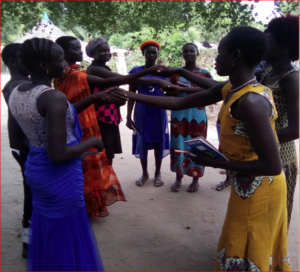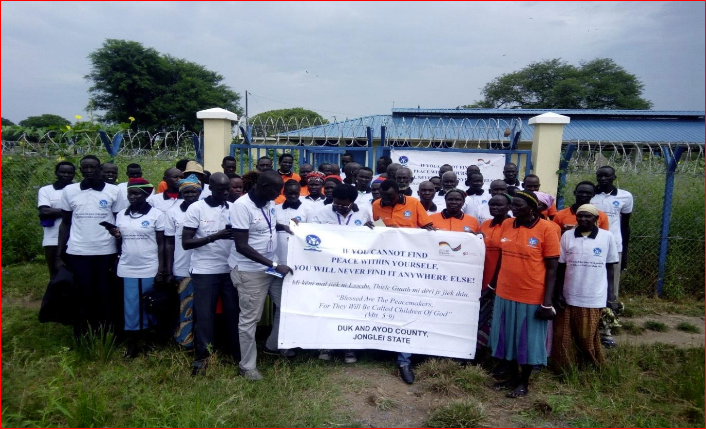Peace Building and Conflict Resolution
Generally, the main drivers of conflicts in South Sudan include among others; failure of delivery of services equitably, intended political contest from the national down to the local level and absence of institutions with the capacity to control violence also ensures its escalation. The current political violence in South Sudan has a direct effect on the general population as over one million people are estimated to have been displaced from their homes while more than fifty thousand lost their lives.

A group of women holding hands to symbolize peace and reconciliation …
Peace is not a need but a necessity, the prerequisite for conflict resolution in our societies is crucial, it’s imperative because no two people perceive a particular thing exactly in the same way. Efforts to curb conflicts and crisis situations have often times been unsuccessful, occasioned by the complex nature of humanity but also by the methods and means employed by those in mediation. Any initiative for reconciliation and conflict resolution rests upon the conviction that present relationships are flawed and that wrong or injustices have been committed.
In a bid to achieve our intended objectives, PASS will uses tested tools, strategies, and methodologies that have worked in various settings undergone crisis-torn societies. These include and not limited to:
- Story sharing of experiences of the conflict- more precisely experiences of trauma, bereavement, separation and socioeconomic inequalities.
- Training of Paralegals as peace defenders and advocates to educate the public of the importance of Human Rights and peaceful co-existence
- Dialogue sessions, looking at the views of the conflict, its history and causes. Dialogues will also include view of one’s self and the other adversary
- Develop and Print and Distribute IEC materials (posters, T-shirts, Banners, fliers etc.) with peace messages
- Sporting & games activities for youths focusing on peace building and conflict transformation
- Formation of local community peace committees, interrogating the norms of interactions and interpretations of values such as peace and reconciliation
PASS’s strategy is inclusive of engagement for both young & old in peace-building activities, Young people alone by no means have the answers to the challenges the world and communities around the world are facing, neither does older generations. However, by bringing together the vision of young people today, and the experience of older generations, new answers to challenges are created.

PASS Staff and volunteers posting for a picture after attending a peace building and reconciliation training in Jiech, Ayod County, South Sudan
Through partnerships with community groups and elder councils, youths can demonstrate the benefits of their peace actions and such communication and collaboration channels also enable young people and adults to explore the common problems they face and to tackle them together, thus participating in the emergence of sustainable solutions. PASS programs on conflict transformation and peace building aimed at strengthening resilience, social cohesion and human security of conflict affected communities in South Sudan.
In conflict sensitivity approach, PASS safeguards the beneficiaries, staff and partner selection does not raise or reinforce existing tensions and will conduct a conflict analysis to avoid negative impacts and increase positive outcomes.


